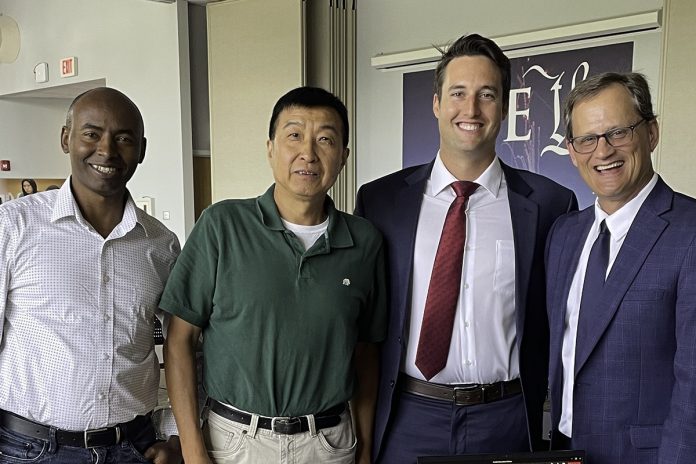Liberty University offers undergraduate and graduate degrees through residential and online programs. Choose from more than 700 programs of study.
Whether you are looking for a bachelor’s, master’s, or doctoral degree, find out everything you need to know about getting into the program you want and how much it will cost for tuition and other fees.
Grow in your faith as you participate in the wide variety of ministry and mission opportunities at Liberty University.
Your schedule may be packed, but make sure you take some time to clear your head with one of the many recreational activities going on at Liberty University.
A thriving athletics program has been an integral part of Liberty University’s vision from the beginning, and today Liberty has 20 NCAA Division I athletic teams, 41 Club Sports teams, and 20 intramural sports.
Get a world-class education with the solid Christian foundation you’re looking for at Liberty University. Here, you’ll gain the values, knowledge, and skills you’ll need for success in every aspect of life.
School of Engineering’s first Ph.D. graduate turns from protégé to professor
Additional Navigation
July 19, 2022 : By Ted Allen – Office of Communications & Public Engagement
Dr. Tate Fonville, who became the Liberty University School of Engineering’s (LUSE) first Ph.D. graduate in May and recently began his new role as an assistant professor in mechanical engineering, sees a world of potential for the department as it experiences a tremendous growth spurt.
“I believe that God wants to fulfill a vision and a mission for His Kingdom here on Earth through our university,” Fonville said. “Ultimately, that was the purpose of Liberty University, to be God’s university, to be used as a tool for God to affect and enact change throughout all the nations of the world. I am super excited to be here and be a part of it.”
There are now 30 Ph.D. students — focusing on everything from mechanical and industrial engineering to thermofluids and computational materials — enrolled in Liberty’s engineering program. After celebrating its first master’s graduates this year, the school now has 15 residential and approximately 50 online master’s degree students.
“We are still developing and growing the program, and we wanted to hire someone who has the vision and could carry it through for us,” School of Engineering Dean Dr. Mark Horstemeyer said of Fonville. “The students love him. Everyone loves him.”
Fonville, who previously studied under Horstemeyer at Mississippi State University, said he has gained invaluable insight from the faith-based instruction he received from his professors at Liberty, who personally mentored him.
“The faculty and the professors that I know are all joyful, and they love doing their job,” he said. “They prioritize connections, and they prioritize just knowing people and pouring into the students. So the university is growing, but the professors have maintained that Christian aspect of sharing the love that they have in their hearts with students and with everyone around them.”
One of his goals, he said, is to follow their example, “to maintain that original vision that (Liberty founder Jerry) Falwell Sr. had, with the renewed fire that I can bring in as a younger faculty member.”
In addition to teaching four classes in the fall, Fonville will be advising master’s and Ph.D. research students at the Center for Engineering Research & Education (CERE) in nearby Bedford County, as well as directing and serving as a faculty advisor for the school’s nine student competition teams, ranging from racecars (including Formula SAE, Baja, and human-powered vehicles) to robots, rockets, and rollercoasters.
“CERE is overflowing now, so we’ve got students being trained on some of the most advanced state-of-the art equipment in research and science that you can imagine,” Fonville said. “We’ve got students who are broadening their scope and their ability to go and be effective at top institutions and be a Christian at national laboratories.”
As a Ph.D. student, Fonville did much of his research on concussion-reducing helmet designs, which he has collaborated on with Horstemeyer for the past three years. In early June, he successfully defended his dissertation on “Modeling and Simulating Brain Damage from Football Helmet Impacts.”
Fonville is the lead engineer for Genesis Helmets — which produced prototypes for last year’s NFL Helmet Challenge — and recently represented that company in optimizing an aviator helmet used by the United States Army with replaceable foam liners. In drop testing, the helmet showed a greater than 40-percent improvement over their baseline model in reducing impact damage to the brain.
“They wanted a 40-percent reduction in the G (gravitational force) levels, and they were able to get that based on (Fonville’s) design optimization,” Horstemeyer said. “They thought the reading was a mistake because they said the 40 percent was a dream number.”
“We really blew it out of the water,” Fonville added.
The Genesis Helmet lining is in competition with two other companies to receive a $2 million grant toward furthering the research and producing the helmet for the military.
1971 University Blvd
Lynchburg, VA 24515
Tel: (434) 582-2000






